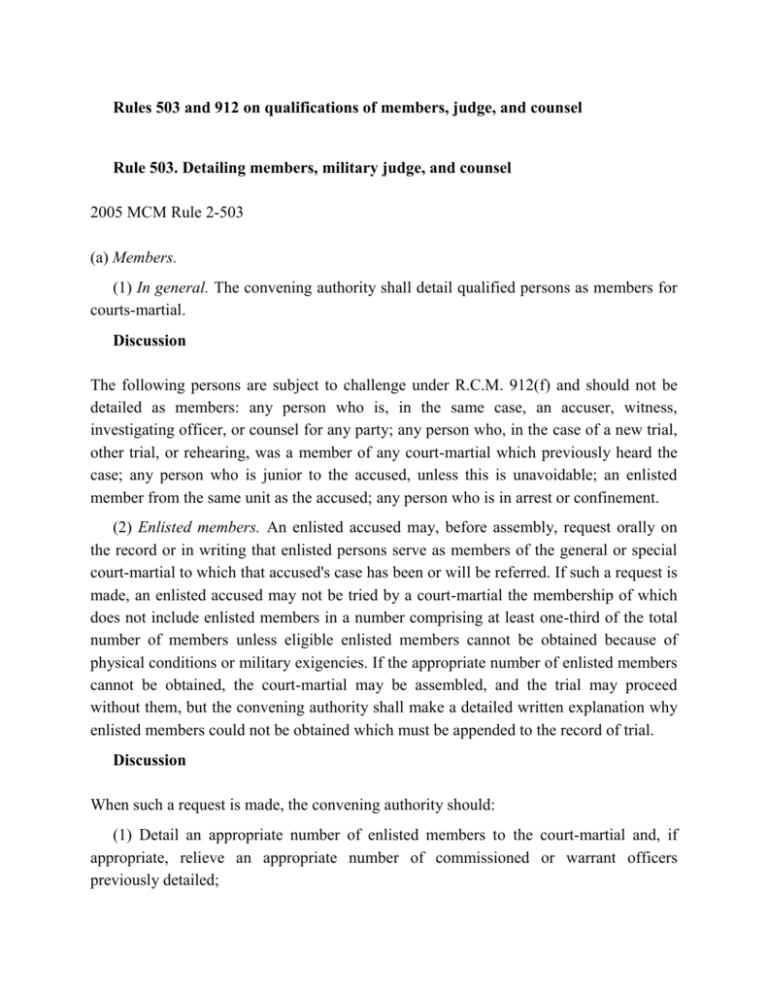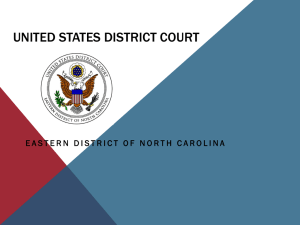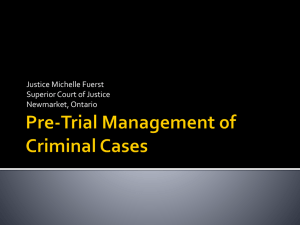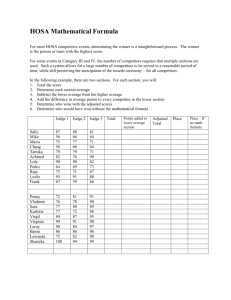MCM
advertisement

Rules 503 and 912 on qualifications of members, judge, and counsel Rule 503. Detailing members, military judge, and counsel 2005 MCM Rule 2-503 (a) Members. (1) In general. The convening authority shall detail qualified persons as members for courts-martial. Discussion The following persons are subject to challenge under R.C.M. 912(f) and should not be detailed as members: any person who is, in the same case, an accuser, witness, investigating officer, or counsel for any party; any person who, in the case of a new trial, other trial, or rehearing, was a member of any court-martial which previously heard the case; any person who is junior to the accused, unless this is unavoidable; an enlisted member from the same unit as the accused; any person who is in arrest or confinement. (2) Enlisted members. An enlisted accused may, before assembly, request orally on the record or in writing that enlisted persons serve as members of the general or special court-martial to which that accused's case has been or will be referred. If such a request is made, an enlisted accused may not be tried by a court-martial the membership of which does not include enlisted members in a number comprising at least one-third of the total number of members unless eligible enlisted members cannot be obtained because of physical conditions or military exigencies. If the appropriate number of enlisted members cannot be obtained, the court-martial may be assembled, and the trial may proceed without them, but the convening authority shall make a detailed written explanation why enlisted members could not be obtained which must be appended to the record of trial. Discussion When such a request is made, the convening authority should: (1) Detail an appropriate number of enlisted members to the court-martial and, if appropriate, relieve an appropriate number of commissioned or warrant officers previously detailed; (2) Withdraw the charges from the court-martial to which they were originally referred and refer them to a court-martial which includes the proper proportion of enlisted members; or (3) Advise the court-martial before which the charges are then pending to proceed in the absence of enlisted members if eligible enlisted members cannot be detailed because of physical conditions or military exigencies. See also R.C.M. 1103(b)(2)(D)(iii). (3) Members from another command or armed force. A convening authority may detail as members of general and special court-martial persons under that convening authority's command or made available by their commander, even if those persons are members of an armed force different from that of the convening authority or accused. Discussion Concurrence of the proper commander may be oral and need not be shown by the record of trial. Members should ordinarily be of the same armed force as the accused. When a courtmartial composed of members of different armed forces is selected, at least a majority of the members should be of the same armed force as the accused unless exigent circumstances make it impractical to do so without manifest injury to the service. (b) Military judge. (1) By whom detailed. The military judge shall be detailed, in accordance with regulations of the Secretary concerned, by a person assigned as a military judge and directly responsible to the Judge Advocate General or the Judge Advocate General's designee. The authority to detail military judges may be delegated to persons assigned as military judges. If authority to detail military judges has been delegated to a military judge, that military judge may detail himself or herself as military judge for a courtmartial. (2) Record of detail. The order detailing a military judge shall be reduced to writing and included in the record of trial or announced orally on the record at the court-martial. The writing or announcement shall indicate by whom the military judge was detailed. The Secretary concerned may require that the order be reduced to writing. 2 (3) Military judge from a different armed force. A military judge from one armed force may be detailed to a court-martial convened in a different armed force when permitted by the Judge Advocate General of the armed force of which the military judge is a member. The Judge Advocate General may delegate authority to make military judges available for this purpose. (c) Counsel. (1) By whom detailed. Trial and defense counsel, assistant trial and defense counsel, and associate defense counsel shall be detailed in accordance with regulations of the Secretary concerned. If authority to detail counsel has been delegated to a person, that person may detail himself or herself as counsel for a court-martial. (2) Record of detail. The order detailing a counsel shall be reduced to writing and included in the record of trial or announced orally on the record at the court-martial. The writing or announcement shall indicate by whom the counsel was detailed. The Secretary concerned may require that the order be reduced to writing. (3) Counsel from a different armed force. A person from one armed force may be detailed to serve as counsel in a court-martial in a different armed force when permitted by the Judge Advocate General of the armed force of which the counsel is a member. The Judge Advocate General may delegate authority to make persons available for this purpose. 3 Rule 912. Challenge of selection of members; examination and challenges of members 2005 MCM Rule 2-912 (a) Pretrial matters. (1) Questionnaires. Before trial the trial counsel may, and shall upon request of the defense counsel, submit to each member written questions requesting the following information: (A) Date of birth; (B) Sex; (C) Race; (D) Marital status and sex, age, and number of dependents; (E) Home of record; (F) Civilian and military education, including, when available, major areas of study, name of school or institution, years of education, and degrees received; (G) Current unit to which assigned; (H) Past duty assignments; (I) Awards and decorations received; (J) Date of rank; and (K) Whether the member has acted as accuser, counsel, investigating officer, convening authority, or legal officer or staff judge advocate for the convening authority in the case, or has forwarded the charges with a recommendation as to disposition. Additional information may be requested with the approval of the military judge. Each member's responses to the questions shall be written and signed by the member. Discussion Using questionnaires before trial may expedite voir dire and may permit more informed exercise of challenges. 4 If the questionnaire is marked or admitted as an exhibit at the court-martial it must be attached to or included in the record of trial. See R.C.M. 1103(b)(2)(D)(iv) and (b)(3)(B). (2) Other materials. A copy of any written materials considered by the convening authority in selecting the members detailed to the court-martial shall be provided to any party upon request, except that such materials pertaining solely to persons who were not selected for detail as members need not be provided unless the military judge, for good cause, so directs. (b) Challenge of selection of members. (1) Motion. Before the examination of members under subsection (d) of this rule begins, or at the next session after a party discovered or could have discovered by the exercise of diligence, the grounds therefor, whichever is earlier, that party may move to stay the proceedings on the ground that members were selected improperly. Discussion See R.C.M. 502(a) and 503(a) concerning selection of members. Members are also improperly selected when, for example, a certain group or class is arbitrarily excluded from consideration as members. (2) Procedure. Upon a motion under subsection (b)(1) of this rule containing an offer of proof of matters which, if true, would constitute improper selection of members, the moving party shall be entitled to present evidence, including any written materials considered by the convening authority in selecting the members. Any other party may also present evidence on the matter. If the military judge determines that the members have been selected improperly, the military judge shall stay any proceedings requiring the presence of members until members are properly selected. (3) Waiver. Failure to make a timely motion under this subsection shall waive the improper selection unless it constitutes a violation of R.C.M. 501(a), 502(a)(1), or 503(a)(2). (c) Stating grounds for challenge. The trial counsel shall state any ground for challenge for cause against any member of which the trial counsel is aware. (d) Examination of members. The military judge may permit the parties to conduct the examination of members or may personally conduct the examination. In the latter event 5 the military judge shall permit the parties to supplement the examination by such further inquiry as the military judge deems proper or the military judge shall submit to the members such additional questions by the parties as the military judge deems proper. A member may be questioned outside the presence of other members when the military judge so directs. Discussion Examination of the members is called "voir dire." If the members have not already been placed under oath for the purpose of voir dire (see R.C.M. 807(b)(2) Discussion (B)), they should be sworn before they are questioned. The opportunity for voir dire should be used to obtain information for the intelligent exercise of challenges; counsel should not purposely use voir dire to present factual matter which will not be admissible or to argue the case. The nature and scope of the examination of members is within the discretion of the military judge. Members may be questioned individually or collectively. Ordinarily, the military judge should permit counsel to personally question the members. Trial counsel ordinarily conducts an inquiry before the defense. Whether trial counsel will question all the members before the defense begins or whether some other procedure will be followed depends on the circumstances. For example, when members are questioned individually outside the presence of other members, each party would ordinarily complete questioning that member before another member is questioned. The military judge and each party may conduct additional questioning, after initial questioning by a party, as necessary. Ordinarily the members should be asked whether they are aware of any ground for challenge against them. This may expedite further questioning. The members should be cautioned, however, not to disclose information in the presence of other members which might disqualify them. (e) Evidence. Any party may present evidence relating to whether grounds for challenge exist against a member. (f) Challenges and removal for cause. (1) Grounds. A member shall be excused for cause whenever it appears that the member: (A) Is not competent to serve as a member under Article 25(a), (b), or (c); 6 (B) Has not been properly detailed as a member of the court-martial; (C) Is an accuser as to any offense charged; (D) Will be a witness in the court-martial; (E) Has acted as counsel for any party as to any offense charged; (F) Has been an investigating officer as to any offense charged; (G) Has acted in the same case as convening authority or as the legal officer or staff judge advocate to the convening authority; (H) Will act in the same case as reviewing authority or as the legal officer or staff judge advocate to the reviewing authority; (I) Has forwarded charges in the case with a personal recommendation as to disposition; (J) Upon a rehearing or new or other trial of the case, was a member of the courtmartial which heard the case before; (K) Is junior to the accused in grade or rank, unless it is established that this could not be avoided; (L) Is in arrest or confinement; (M) Has informed or expressed a definite opinion as to the guilt or innocence of the accused as to any offense charged; (N) Should not sit as a member in the interest of having the court-martial free from substantial doubt as to legality, fairness, and impartiality. Discussion Examples of matters which may be grounds for challenge under subsection (N) are that the member: has a direct personal interest in the result of the trial; is closely related to the accused, a counsel, or a witness in the case; has participated as a member or counsel in the trial of a closely related case; has a decidedly friendly or hostile attitude toward a party; or has an inelastic opinion concerning an appropriate sentence for the offenses charged. (2) When made. 7 (A) Upon completion of examination. Upon completion of any examination under subsection (d) of this rule and the presentation of evidence, if any, on the matter, each party shall state any challenges for cause it elects to make. (B) Other times. A challenge for cause may be made at any other time during trial when it becomes apparent that a ground for challenge may exist. Such examination of the member and presentation of evidence as may be necessary may be made in order to resolve the matter. (3) Procedure. Each party shall be permitted to make challenges outside the presence of the members. The party making a challenge shall state the grounds for it. Ordinarily the trial counsel shall enter any challenges for cause before the defense counsel. The military judge shall rule finally on each challenge. When a challenge for cause is granted, the member concerned shall be excused. The burden of establishing that grounds for a challenge exist is upon the party making the challenge. A member successfully challenged shall be excused. (4) Waiver. The grounds for challenge in subsection (f)(1)(A) of this rule may not be waived except that membership of enlisted members in the same unit as the accused may be waived. Membership of enlisted members in the same unit as the accused and any other ground for challenge is waived if the party knew of or could have discovered by the exercise of diligence the ground for challenge and failed to raise it in a timely manner. Notwithstanding the absence of a challenge or waiver of a challenge by the parties, the military judge may, in the interest of justice, excuse a member against whom a challenge for cause would lie. When a challenge for cause has been denied, failure by the challenging party to exercise a peremptory challenge against any member shall constitute waiver of further consideration of the challenge upon later review. However, when a challenge for cause is denied, a peremptory challenge by the challenging party against any member shall preserve the issue for later review, provided that when the member who was unsuccessfully challenged for cause is peremptorily challenged by the same party, that party must state that it would have exercised its peremptory challenge against another member if the challenge for cause had been granted. Discussion See also Mil. R. Evid. 606(b) when a member may be a witness. (g) Peremptory challenges. 8 (1) Procedure. Each party may challenge one member peremptorily. Any member so challenged shall be excused. No party may be required to exercise a peremptory challenge before the examination of members and determination of any challenges for cause has been completed. Ordinarily the trial counsel shall enter any peremptory challenge before the defense. Discussion Generally, no reason is necessary for a peremptory challenge. But see Batson v. Kentucky 476 U.S. 79 (1986); United States v. Curtis, 33 M.J. 101 (C.M.A. 1991), cert. denied, 112 S.Ct. 1177 (1992); United States v. Moore, 28 M.J. 366 (C.M.A. 1989); United States v. Santiago-Davilla, 26 M.J. 380 (C.M.A. 1988). (2) Waiver. Failure to exercise a peremptory challenge when properly called upon to do so shall waive the right to make such a challenge. The military judge may, for good cause shown, grant relief from the waiver, but a peremptory challenge may not be made after the presentation of evidence before the members has begun. However, nothing in this subsection shall bar the exercise of a previously unexercised peremptory challenge against a member newly detailed under R.C.M. 505(c)(2)(B), even if presentation of evidence on the merits has begun. Discussion When the membership of the court-martial has been reduced below a quorum (see R.C.M. 501) or, when enlisted members have been requested, the fraction of enlisted members has been reduced below one-third, the proceedings should be adjourned and the convening authority notified so that new members may be detailed. See R.C.M. 505. See also R.C.M. 805(d) concerning other procedures when new members are detailed. (h) Special courts-martial without a military judge. In a special court-martial without a military judge, the procedures in this rule shall apply, except that challenges shall be made in the presence of the members and a ruling on any challenge for cause shall be decided by a majority vote of the members upon secret written ballot in closed session. The challenged member shall not be present at the closed session at which the challenge is decided. A tie vote on a challenge disqualifies the member challenged. Before closing, the president shall give such instructions as may be necessary to resolve the challenge. Each challenge shall be decided separately, and all unexcused members except the challenged member shall participate. When only three members are present and one is 9 challenged, the remaining two may decide the challenge. When the president is challenged, the next senior member shall act as president for purposes of deciding the challenge. (i) Definitions. (1) Military judge. For purpose of this rule, "military judge" does not include the president of a special court-martial without a military judge. (2) Witness. For purposes of this rule, "witness" includes one who testifies at a courtmartial and anyone whose declaration is received in evidence for any purpose, including written declarations made by affidavit or otherwise. Discussion For example, a person who by certificate has attested or otherwise authenticated an official record or other writing introduced in evidence is a witness. (3) Investigating officer. For purposes of this rule, "investigating officer" includes any person who has investigated charges under R.C.M. 405 and any person who as counsel for a member of a court of inquiry, or otherwise personally has conducted an investigation of the general matter involving the offenses charged. 10








